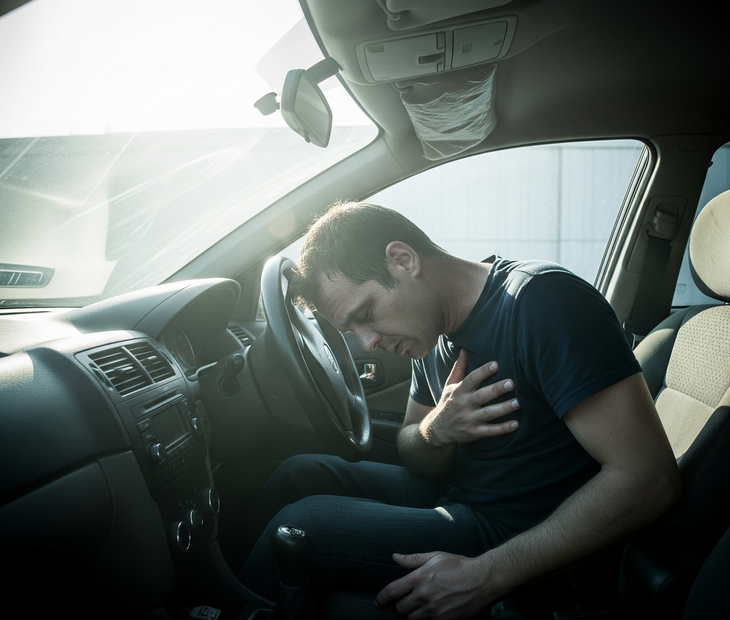Doctors warn of the risk of suffocation and chemical poisoning when using cars during hot weather - Photo: AI
The boy’s father said that the day before, he bought a bottle of plastic welding chemicals and left it in the trunk of his car, and that the chemical contained styrene. The incident also warned about the dangers of leaving chemicals in cars, especially during hot weather.
Warning of dangers from chemicals left in cars
According to Dr. Nguyen Huy Hoang - Vietnam - Russia High Pressure Oxygen Center, Ministry of National Defense , styrene is a colorless liquid with a light aroma, often used to produce polystyrene plastic, glue, and composite materials.
However, this is a substance that can evaporate quickly, has a vapor density nearly 4 times that of air and is extremely flammable. When left in a closed space such as a car, especially under high temperatures, styrene vapor can easily accumulate to toxic levels without needing a large amount.
Many people mistakenly think that "being able to smell something means being able to control it", but in reality, when the concentration increases, people can lose the ability to recognize the smell due to getting used to it, leading to subjectivity and slow reaction.
"Inhaling high concentrations of styrene over a short period of time can cause dizziness, headache, confusion, and in severe cases like the recent child patient, coma, respiratory failure, and heart failure.
Long-term exposure, even at lower concentrations, can also affect the liver, nervous system and cardiovascular system. Children with immature respiratory and nervous systems are especially susceptible to serious damage," said Dr. Hoang.
According to this expert, cars are designed to be airtight to insulate against sound and retain heat, but that turns them into "chemical boxes" if there are items emitting toxic substances inside.
Turning on the air conditioner in the internal air intake mode is very common, preventing toxic gases from escaping, while high temperatures promote strong evaporation from solvents, detergents, glues or... chemical bottles "forgotten" under the trunk.
"In the recent incident, the plastic welding bottle containing styrene may not have been sealed properly or degraded over time, allowing the toxic gas to leak silently. With high vapor pressure, the styrene evaporates and settles in the low area right where the child sat. After about an hour, the concentration in the car can far exceed the safety threshold for humans, causing severe poisoning," Dr. Hoang said.
Other dangers of leaving your car in the sun
Doctor Hoang also said that the temperature inside a closed car under the sun can reach 60 - 80°C after only 30 - 40 minutes.
A series of familiar items can become time bombs such as spray cans, lighters, cosmetics, spare batteries, and even plastic water bottles.
Specifically, items that are easily explosive or flammable include lighters, compressed air sprays, cosmetics, pharmaceuticals, power banks, carbonated water, plastic bottles, and crystal glasses.
Some items do not explode but can be denatured or produce toxins when exposed to high heat: medicines, cosmetics, food, plastic bottles containing BPA.
Electronic devices containing Li-ion or Li-Po batteries are susceptible to overheating, causing acid leakage or explosion. The phenomenon of light converging through transparent objects such as water bottles or eyeglasses can cause fires in the car interior. In addition, bacteria grow rapidly in food when the car is hot, causing the risk of poisoning.
Another danger is that CO gas (colorless, odorless) can leak from the exhaust pipe when the car is running on the spot. CO gas from the exhaust pipe can seep into the cabin through gaps or the air conditioning system, especially dangerous when the car is parked in a closed place, garage, basement.
Cases of CO poisoning while sleeping in a car with the air conditioner on have been recorded and have led to tragic consequences.
To prevent this, Dr. Hoang recommends that you never store chemicals in the car. If you must carry them, use specialized packaging, close the lid, place them in a separate compartment, and only for a short time.
Always prioritize outside air when turning on the air conditioner. Regularly maintain the ventilation system, cabin air filter, and absolutely do not sleep in the car with the air conditioner on in a closed place. When you see any suspicious signs such as dizziness, headache, nausea in the car - open all the windows, get out and find a fresh air place immediately.
"A car is a convenient means of transportation, not a storage room or a midday break room. Just one careless act, a seemingly harmless bottle of chemicals, can turn the car's compartment into a deadly trap," Dr. Hoang warned.
WILLOW
Source: https://tuoitre.vn/tu-vu-be-trai-ngo-doc-hoa-chat-trong-o-to-canh-bao-nguy-hiem-trong-mua-nang-nong-2025060414180974.htm




































































































Comment (0)